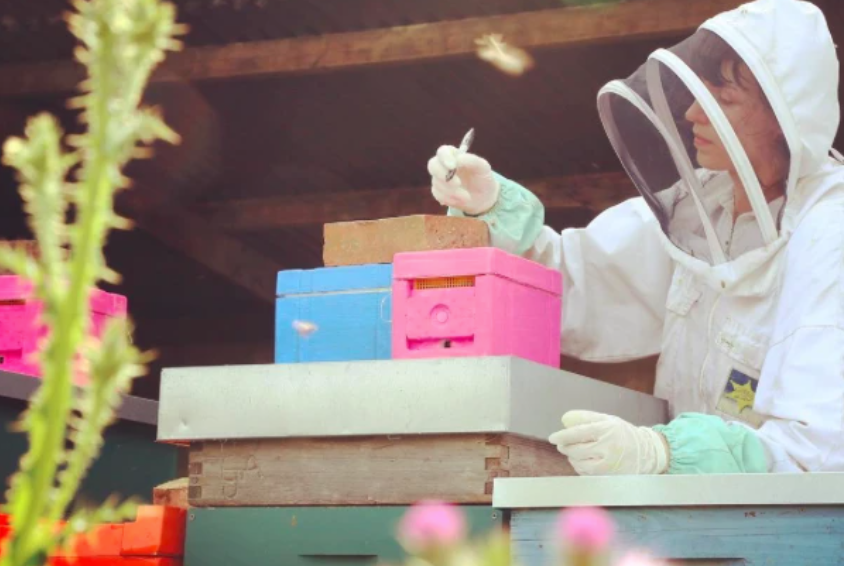
Meet the London Honey Company team: Hannah Reeves
We sit down with Hannah, our first apprentice beekeeper and host of our online courses
I first started keeping bees at 16, and not having a sweet tooth, never really ate the honey. When I started my apprenticeship with LHC I discovered the huge variation in colour, taste and texture of honey. I was lucky enough to travel round different counties to manage the bees, all of which produced wildly different honeys. Heather honey from Shropshire, Kent beach honey from Dungeness, lime honey from Oxfordshire, and of course London honey. Even within London the taste and colour of the honeys changed between apiaries. Back at the warehouse there was a whole world of flavours to try. Honey is imported in barrels to be processed for London stores; Forest honey from Zambia, lemon blossom from Spain, leatherwood from Tasmania, Manuka from New Zealand, and the list goes on.
I started at LHC in 2014 as one of the first BFA (Bee Farmers’ Association) apprentices. The apprenticeship scheme was launched to get more young people into commercial bee farming, as the average age of a bee farmer in the UK is 66. My apprenticeship lasted 3 years, and after graduation I continued to work for LHC as a beekeeper. My main focus now is running the beekeeping courses; either a half day classroom session at our bee HQ, or a full day where we go and visit the bees in the afternoon. At the moment we are running our courses online via Zoom which is proving a fantastic way for us to keep the courses going. It's working so well I think we'll continue to offer an online option in the future so that people can join us from anywhere in the country.

What were you doing before honey, or has it always been honey?
It’s always been honey focused. I studied Ecology at university, spending my work placement at Rothamsted Research’s Bee Department. I went on to do my dissertation on bees, and after graduation, immediately started the BFA apprenticeship.

I definitely enjoy being outside in spring and summer and working with my hands. Whether it’s a beautiful rural location or great views from an urban rooftop or garden it’s nice to have a change of scenery. It’s very relaxing to open a hive, hear the hum of the bees, smell the wax and propolis, and feel the warmth of the hive as you reach in to pull out a frame. There’s always something new to learn about bees; you’ll catch them doing something you haven’t seen before and find yourself reading up about it at home later
What’s a normal day at the job for you?
That would depend on the time of year and what jobs would need to be done. In summer most days would be spent driving around to check the bees and adding supers (honey boxes). Towards the end of summer, we start harvesting honey, and on rainy days we begin the process of extracting and bottling. Over the autumn and winter, it’s mainly working in the packing room cutting comb and bottling honey. We also clean and repair equipment, melt down old frames and use the wax to make candles.
What’s your favourite honey currently?
A tough question! I change my mind throughout the season, switching to whatever we’ve freshly harvested. Recently, I’ve been quite interested in all the food pairings for honey, especially with cheese and currently - grilled halloumi drizzled with London honey.
And lastly, any tips to people that are just getting into honey - there are so many choices, where do you begin?
If like me you initially didn’t eat honey or have sweet tooth, I’d recommend starting with a honey that isn’t particularly strong or sweet, like borage, and mix it in with your tea or coffee, maybe even a hot honey and lemon. Not all honey tastes the same so keep trying different varieties – there’s something out there for everyone. As a general rule the darker the honey is, the stronger the flavour. If you want something sweet and floral try a wildflower honey, rich and savoury go for our Kent sweet chestnut honey. Even the textures vary; freshly harvested honey is runny but will eventually set quite hard, we can also ‘cream’ it to make a soft set honey which is perfect for spreading on toast. There’s also the added benefit of an immune boost from local honey.
During our online beekeeping course, we post out a honey tasting kit and have a tasting session where we discuss how the honey was made, the flavours, and suggest recipes it would work well in. They are lively and interactive courses... and always a really interesting group of people too!

Want to learn more? Sign up to one of Hannah's classes.

